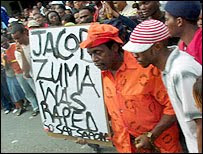
There is quite a lot of debate around the limits to freedom of speech since Malema was found in contravention of the Equality Act today. Robert Brand has recently written a blog post in which he argues that Malema's comments on the woman accused of rape should not have received censure by the Equality Court. Although I think there is much merit in what Prof Brand has to say, I think that his analysis is not entirely complete.
Mr Brand suggests that the Equality Act prohibits speech that would not otherwise be prohibited under the Constitution. The Constitution prohibits speech amounting to hate speech on grounds of race, ethnicity, gender or religion and constitutes incitement to cause harm. However, the Equality Act goes to far because it includes incitement on grounds other than those listed in the Constitution. The Constitution requires that the speech is intended to cause harm. However, the Equality Act prohibits speech that can be construed as having the intention to cause harm. In this way, people with innocent intentions could be found guilty of hate speech.
I think that there is much merit to Mr Brand's argument. The Equality Act has, by all reports, massive constitutional problems. However, I am not convinced that this is the right case to challenge the act, especially not on the grounds raised by Mr Brand.
Firstly, the issue is not only whether what Malema said would constitute hate speech according to the definition of hate speech in the Constitution. Even if it does not constitute hate speech according to the hate speech, it may be constitutional to prohibit the speech. In other words, the prohibition may fall foul of the right to freedom of speech. However, it would still be necessary to determine whether such a limitation may be justified according to section 36 of the Constitution. Section 36 has a check-list of considerations that need to be dealt with in order to determine whether a limitation is permissible. In this case, the Court may be influenced by a desire to protect the complainants in rape cases (even unsuccessful ones) and construe that as a legitimate purpose that justifies limiting freedom of speech.
Secondly, a similar argument can be made concerning the lack of the element of intentionality in the Equality Act's definition of hate speech. The Con Court has recognized that intentionality is a very important element when one is committing a crime. However, it has acknowledged that in some instances a lower threshold may be permitted. For instance, it may be possible that negligently committing hate speech warrants sanctioning for similar reasons to the ones in the previous paragraph.
I would be interested to hear the views of the guys over at SA4L




Interesting argument David, but I don't think it rebuts my argument that this would be a good test case for the Equality Act. The constitutional question is whether the Act is too wide in its application. Yes, Malema's comments could be unlawful on other grounds (e.g. the general limitations clause), but they were found in this instance ot be unlawful in terms of the hate speech provisions in the Equality Act, and those are open to constitutional challenge. While many would find it distasteful to defend Malema's constitutional right to be obnoxious, it would be a sort of Larry Flynt case for SA.
ReplyDeleteIn the event that this particular regulation is actually forced as well as used properly, the web won't be considered a less dangerous location for the kids, however it will end up the less dangerous atmosphere for each Web person questions to ask people
ReplyDelete